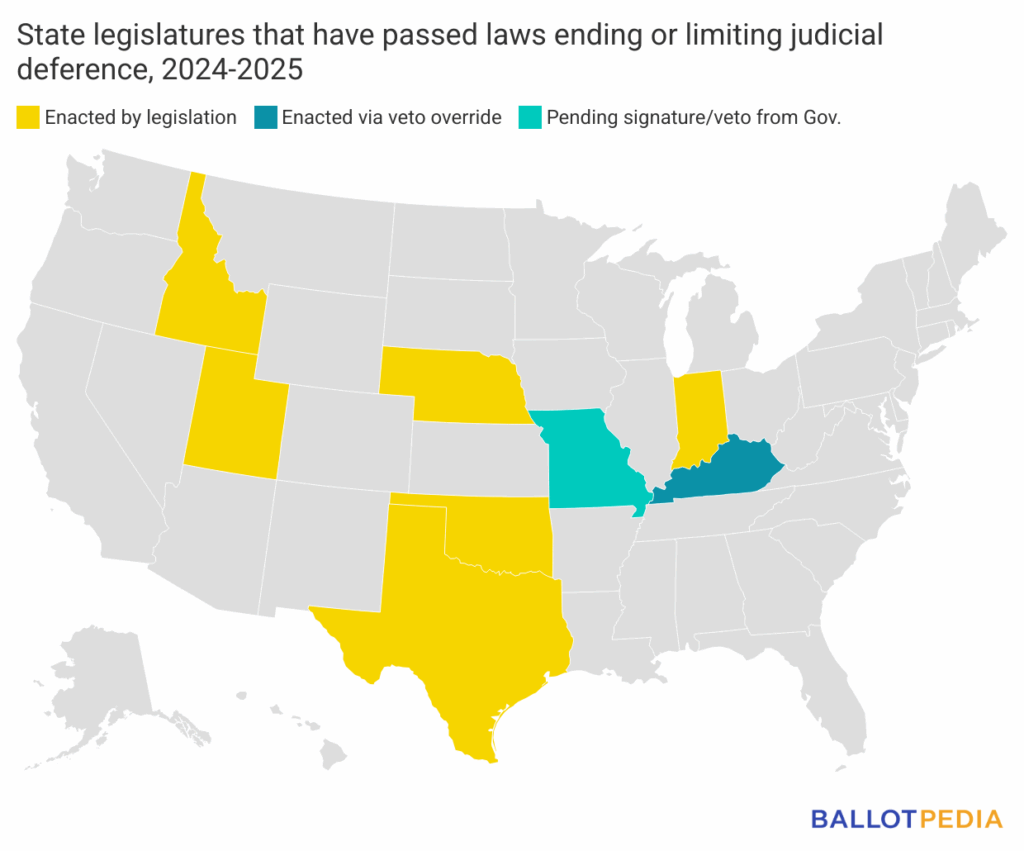What's the story
In the 2025 legislative sessions, Kentucky, Oklahoma, and Texas enacted laws prohibiting judicial deference by state courts to state administrative agencies. In a fourth state, Missouri, the legislature approved a bill and sent it to the governor’s desk. It had not been signed as of June 13.
Three states were Republican trifectas. The other, Kentucky, has a divided government, and the Republican-controlled legislature overrode Gov. Andy Beshear’s (D) veto.
Going into 2025, in all four states, courts commonly or routinely gave deference to state agencies.
Background
Judicial deference is central to many debates about the administrative state and the balance of power between agencies and the courts. State-level approaches to judicial deference vary significantly, and state courts are not required to conform to federal deference standards.
Judicial deference matters when there are disputes over or challenges to agency rules, judgments, penalty assessments, or other actions. When state courts give deference to state agencies, courts yield their own judgment to the agencies' determinations. It can apply to the agency's interpretation of the law or to the interpretation, adjudication, and application of published rules. It can also apply to findings of fact.
The Chevron doctrine of judicial deference refers to the administrative law principle that requires federal courts to defer to a federal agency’s interpretation of an ambiguous or unclear statute.
The 1984 U.S. Supreme Court opinion in Chevron U.S.A., Inc. v. Natural Resources Defense Council, Inc. outlined the original, two-step Chevron process. The Supreme Court overturned it last year in Loper Bright Enterprises v. Raimondo. Check out last year’s episode of On The Ballot to learn more about that decision.
Missouri
The Missouri Legislature approved Senate Bill 221, which prohibits judicial deference. The Senate passed the bill 25-7 on March 6, with two Democrats and 23 Republicans voting in favor, and seven Democrats opposed. The House passed the bill 120-20 on May 15, with 16 Democrats and 104 Republicans voting in favor, and 20 Democrats opposed. It was delivered to Gov. Mike Kehoe (R) on May 30.
Missouri courts currently give deference to state agencies in cases routinely, while there are also instances of courts opting against deference. The Pacific Legal Foundation classified judicial deference as inconsistent. The State Court Report said Missouri gives "agencies’ interpretations 'considerable weight' or 'appreciable deference.' [...] in Missouri, courts 'defer to the expertise of an administrative agency in reaching decisions based on scientific and technical data.'"
Oklahoma
Oklahoma Gov. Kevin Stitt (R) signed House Bill 2729 on May 21 after it passed the Oklahoma House 71-16 on May 14 and the Senate 37-8 on May 5. Both chambers passed the bill along party lines, with Republicans in favor and Democrats opposed. HB 2729 prohibits state courts from deferring to a state agency when the courts interpret statutes, rules, or other regulations. The law instead requires courts to interpret the meaning and effect of the rule using a de novo standard and requires state courts to give a "reasonable interpretation which limits agency power and maximizes individual liberty" when there is ambiguity.
Prior to HB 2729, state courts commonly deferred to agencies when reviewing rules and agency actions. Research by the Pacific Legal Foundation stated Oklahoma courts generally defer to agency interpretations of statutes and rules. The State Court Report said Oklahoma employed robust deference to agency interpretations.
Kentucky
On March 27, the Kentucky General Assembly overrode Gov. Andy Beshear’s (D) veto of Senate Bill 84. The bill said that “[a]n administrative body shall not interpret a statute or administrative regulation with the expectation that the interpretation of the administrative body is entitled to deference from a reviewing court.” Kentucky is one of two states with a governor of one party and a state legislature of another party that holds a veto-proof majority. In Kentucky, a simple majority of the state legislature is required to override a gubernatorial veto.
Prior to SB 84, state courts commonly deferred to agencies when reviewing rules and agency actions. The State Court Report said Kentucky employed robust deference to agency interpretations. The Pacific Legal Foundation categorized Kentucky as a state with inconsistent deference, but favored an analysis that the norm was deference.
Texas
Texas Gov. Greg Abbott (R) signed Senate Bill 14 on April 23. The Senate passed it 26-5 on March 26, and the House passed it 97-51 on April 9. The bill said that courts must interpret the law “without giving deference to any legal determination by a state agency.”
Concerning Texas judicial deference policy prior to SB 14, the State Court Report said Texas “employ[ed] robust deference to agency interpretations.” According to the Pacific Legal Foundation, Texas courts defer to agencies' interpretations unless they are plainly inaccurate or inconsistent with statute.
Context: Judicial deference in the states
Since 2013, 14 states (15 if the Missouri governor signs SB 221) have ended or restricted state court deference to state administrative agencies. Some states restricted or ended judicial deference through court rulings, while others did so through legislation. One state, Florida, eliminated judicial deference through a 2018 constitutional amendment approved by voters. In the other 35 states, levels of deference and specific deference standards applied by state courts to agency rules and actions vary.
The map below shows the eight state legislatures that have passed bills ending or limiting judicial deference in 2024 and 2025 so far.

Click here to see Ballotpedia’s extensive resource on the administrative state and our content specific to the Chevron doctrine. You can also click here to use Ballotpedia’s Administrative State Legislation Tracker to see a list of the 35 bills related to judicial deference introduced this year.
Additional reading:



